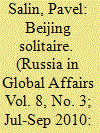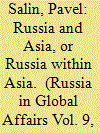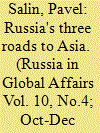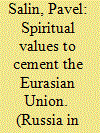| Srl | Item |
| 1 |
ID:
100617


|
|
|
| 2 |
ID:
158193


|
|
|
|
|
| Summary/Abstract |
The view that the current system of international relations has reached an impasse is becoming commonplace in the world political discourse. I mean the consequences of the so-called "revolution of multitudes." It was described, as applied to social processes, by futurologists, such as Alvin Toffler a few decades ago and specified in a recent book by Moisés Naím, The End of Power. Briefly, the essence of the "revolution of multitudes" theory is as follows. The number of active participants in social and political activities has increased so much that quantitative changes have become qualitative. Add to this the increased number of contacts and ties (transactions) between these participants. As a result, it has become difficult or even impossible for state institutions to control them by using classical tools. Naím describes this situation as "the decay of power," when the authorities, while retaining formal levers of influence, de facto are much less capable of controlling anything than they were a few decades ago. Simply put, the "revolution of multitudes" has gradually made power less indispensable, because players it used to control are becoming more independent and able to do without it, communicating and making transactions with each other directly.
|
|
|
|
|
|
|
|
|
|
|
|
|
|
|
|
| 3 |
ID:
151546


|
|
|
|
|
| Summary/Abstract |
An informal remark by Russian Foreign Minister Sergei Lavrov made last year that there can be no "business as usual" with the West any more is a belated statement of fact. It reflects only one aspect of the fundamental transformations taking place in the world. Naturally, Russia's foreign policy cannot but respond to these changes, not just ad hoc but doctrinally.
|
|
|
|
|
|
|
|
|
|
|
|
|
|
|
|
| 4 |
ID:
107955


|
|
|
| 5 |
ID:
118606


|
|
|
|
|
| Publication |
2012.
|
| Summary/Abstract |
Over the past couple of years researchers of different countries and schools have developed a unanimous view that the world's "center of power" is moving from the Transatlantic region towards the Pacific. Even inveterate skeptics now have to admit that the economic pole of power has shifted almost entirely to the Asia-Pacific, although they still harbor the illusion that the West in general and Europe in particular will remain cultural centers (including for Russia) and will retain at least part of their political capital. Yet world history shows that a shift of the economic center to another region inevitably entails a similar shift of the cultural and political components of power.
|
|
|
|
|
|
|
|
|
|
|
|
|
|
|
|
| 6 |
ID:
127027


|
|
|
|
|
| Publication |
2013.
|
| Summary/Abstract |
Since Vladimir Putin officially introduced the idea of a Eurasian Union (EAU) two years ago, it has become obvious that the Russian authorities are determined to create a new integration association in the former Soviet Union and that this association will be not only economic or military, but also political. Interestingly, however, all lobbyists for the EAU emphasize only economic interests and practical benefits. The tone was set by the Russian president who stressed that this would be only an economic organization. The name of the future association has been amended as well - now it is referred to not just as a Eurasian but a Eurasian Economic Union.
However, international, including European, practices show that purely material interests are not enough to bring about full-scale and, most importantly, long-term and successful integration. It is only a common ideology and a common system of views that will allow people of all countries in a Eurasian Union to feel as one. One simply needs to invent
|
|
|
|
|
|
|
|
|
|
|
|
|
|
|
|